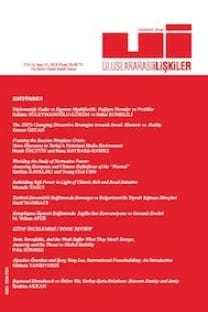Gramsci, Cox ve Hegemonya: Yerelden Küresele, İktidarın Sosyolojisi Üzerine
Uluslararası sistemi derinden etkileyen kriz ve dönüşümler, teorik perspektiflerin yeni konjonktüre ait dinamikler karşısında kendilerini yenilemeleri için bir çağrı niteliği de taşımaktadır. Bu yönde atılabilecek ilk adımlardan biri, kuramların temel önermelerinin zihinsel evrim süreçleri dikkate alınarak gözden geçirilmeleridir. Bu makalede, Robert W. Cox’un Eleştirel Kuramı’nda merkezi bir yere sahip “hegemonya” kavramı ve etrafında kurgulanan iktidar mantığı, entelektüel köklerinin dayandığı Antonio Gramsci’nin çalışmalarıyla mukayeseli olarak incelenmektedir. Makalenin ilk kısmında Gramsci ve Cox’un pozitivizm karşısındaki tavırları, tarihselci epistemolojileri, tarihsel yapılar ve insan eyleminin sınırları arasında kurdukları denge ile kültüre, öznelerarası anlamlar ve kolektif imajlar formundaki fikirlere kuramlarında açtıkları alan ele alınmaktadır. Takip eden kısımlarda ise, ikilinin yerel ve küresel düzeylerdeki hegemonya analizleri mercek altına yatırılmaktadır.
Gramsci, Cox and Hegemony:From Local to Global on the Sociology of Power
Serious crises and transformations, deeply affecting the international system, create a conducive environment in which theoretical perspectives feel an urge to review themselves against the dynamics of the new conjuncture. One of the first steps that can be taken to satisfy this urge is to revievaluate the main tenents of the theories by taking their evolution processes into consideration. fte aim of this study is to contribute to the intellectual efforts in this direction by focusing on one of the core concepts of Neo-Gramscian studies: “hegemony”, that has a central place in the Critical fteory of Robert Cox. ftroughout the article, Coxian “hegemony” and the ruling logic behind it will be examined in comparison with the works of Antonio Gramsci, who laid the intellectual grounds of the concept. fte first section is devoted to Gramsci’s and Cox’s positions vis-a-vis positivism, their historicist epistemology, the balance that they have created between historical structures and the limits of human action as well as the place they opened for culture, intersubjective meanings and collective images in their theories. In the following sections, both authors’ understandings of hegemony within the local and global contexts will also be examined
